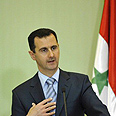
Assad: We were within reach of peace deal
Syrian president tells Italian newspaper La Repubblica Turkish-mediated talks with Israel brought countries very close to agreement after PM Olmert expressed willingness to withdraw from Golan Heights. 'The Israelis' turn to the right is the greatest obstacle to peace,' he says
In an interview to Italian newspaper La Repubblica, published Wednesday, Assad expressed his concern over Israel's future right-wing government.
"I see the finishing line becoming distant. I'm not worried about (Prime Minister-designate Benjamin) Netanyahu, but about the Israeli society's turn to the right, which is reflected in Netanyahu's rise to power. This is the greatest obstacle to peace. And this is after we were already within reach of an agreement," he said.
Assad spoke of how the talks began: "(Outgoing Prime Minister Ehud) Olmert informed Turkish Prime Minister (Recep Tayyip) Erdogan that he is willing to return the Golan Heights. We entered negotiations. The only thing missing was the final details in regards to the 1967 line."
He also spoke of the long talks with Erdogan, with Olmert in the room. "Erdogan was on the line from Istanbul, Olmert was having dinner with him in another room, and I was here in Damascus.
"He wanted to talk to me urgently. There was only one obstacle in the direct talks: An Israeli acceptance of a document marking the 1967 border line, which passes in six geographical points along Lake Kinneret and the Jordan River.
"We were on the phone for hours and hours. Olmert was avoiding the issue. I asked him, through Erdogan, for a clear answer. He suggested delaying the decision by several days, in order to consult his government. But after that, four days later, the war in Gaza broke out. Another missed opportunity. And then Turkey stopped playing by the rules with Israel. It felt deceived."
'We'll wait for an Israeli partner'
Asked whether he saw a possibility of resuming the negotiations with Israel, the Syrian president replied, "In principle I must say yes. We in Syria don't rely on the type of government in Israel.
"The conditions for peace are clear to everyone: The Madrid Conference, the UN resolutions, starting with 242, the 'territories for peace' formula – meaning, returning the Golan Heights to Syria. They must simply want to implement it. We are ready.
Is the 2002 Arab peace plan still on the table? "This will be discussed at the Arab League summit in Doha at the end of the month. It's likely that the plan will be suspended, like with a switch, as we wait for a partner in Israel," Assad said.
He went on to mention the United State's role in the negotiations. "America has an important role, being a superpower. Only Washington can pressure Israel," he said.
He noted, however, that "there are other players in the world", including Turkey, which he said "nurtured relations with the region's states. It acquired their trust as a mediator where the US and Europe failed.
"I think Sarkozy's France plays an important role today. It opened channels to the most influencing elements, understood the changes in the region and jumped on the train on time."
The Syrian leader praised US President Barack Obama, but remains suspicious in regards to the future: "Obama will have to restore the reliability of the US. The first steps he has taken are encouraging: The withdrawal from Iraq, the desire for peace, closing Guantanamo. He seems to be a man of his word. It's premature to say whether this is a historical change."
As for the Iranian nuclear threat, Assad believes that "only a dialogue can solve the dispute with Iran. Iran, whether everyone likes it or not, is an important country."
Will Syria mediate between the US and Iran. "If we are talking about an Iranian influence in Iraq, we must distinguish between an influence which is not negative and based on mutual respect and an intervention.
"If we are talking about promoting a dialogue with Iran, we need a concrete offer to submit to the government. So far I have only received an invitation to play such a role. I agree, but it's not enough. We're missing a plan, rules and specific mechanisms."
He also called for talks with Hamas and Hizbullah and added that his country was involved in the intra-Palestinian reconciliation talks.










